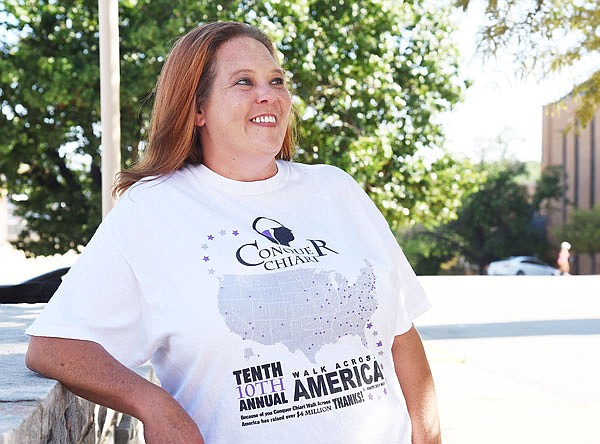As a child, Stephanie Hampton had a series of symptoms that doctors treated individually.
Her headaches and migraines resulted from hormones, doctors said. Her constant runny nose was thought to be a symptom of allergies, for which she received regular shots.
Her back pain stemmed from scoliosis, they said.
She'd been in pain her entire life.
Chiari malformation was not something doctors looked for.
"It never gets diagnosed as a whole," Hampton said. "It always gets diagnosed as separate pieces."
But in 2007, when she was 32, she experienced what was known as a "flare up." She began experiencing pain in her left shoulder and hand. Five months later, the pain had spread down the entire left side of her body.
Fluid-filled cysts had formed on her spinal cord, causing the new symptoms.
Doctors scanned her spinal cord with a magnetic resonance imaging machine and found the Chiari malformation - part of her brain stem extended down through the opening in the base of the skull.
The malformation affects more than 300,000 people nationwide and is believed to occur in one in every 1,000 births.
Treatment for the condition depends on its severity. Some symptoms may be controlled with pain medications. Others require installation of a shunt to relieve pressure or surgery to create more room for the patient's brain.
In the most common surgery for Chiari malformation, doctors remove a small section of bone in the back of the patient's skull to give the brain more room.
The goal is to stop the progression of changes in patients' anatomy, according to the Mayo Clinic. When successful, surgery reduces pressure on the brain and spinal cord and restores the normal flow of spinal fluid.
Hampton was a candidate for decompression surgery, neurologists said.
"I had two choices - do nothing and end up paralyzed or have the surgery and have a 50/50 chance of getting better," she said.
She underwent the procedure at Boone Hospital in Columbia. After enlarging the opening in the base of her skull, surgeons sewed mesh in place to allow more room for her brain.
"I woke up from surgery pain free for the first time in my life," Hampton said.
But some familiar aches do periodically return.
"All my symptoms are still managed at this point," she said. "I can still tell you if it's going to rain or snow, but my headaches are very rare."
She still gets about one migraine every six months. Her back pain is gone. The runny nose is gone.
That's not the outcome most patients have.
"I am an exception to everything that is Chiari-based," Hampton said.
Most people she's met through the annual Conquer Chiari Walk Across America in Jefferson City have had numerous surgeries.
Registration for the 1-mile walk, which is Saturday at the North Jefferson City Pavilion, 927 Fourth St., begins at 1 p.m. The walk begins at 2 p.m. Lunch will be provided. Organizers are asking for a donation of $25 to participate. For information, contact Mary Cremer via email at [email protected].
The walk, one of a series of walks held on the third and fourth Saturday in September every year, draws patients from across the state to raise awareness of the malformation and to raise money for research and education.
The future is always in doubt with Chiari, Hampton said. She understands her worst symptoms may return at any moment. Chiari seems to affect her emotions, she said.
And there is always the possibility that she won't wake up tomorrow.
"I count my blessings every day," she said. "There are some days I'm up and some days when I'm down."
Surgeons told her after the surgery she would be a different person - that it would alter her personality.
"I used to be hard-core, rain-all-the-time, had an attitude, don't-mess-with-me - I was mean," Hampton said. "Now, I'm the nicest person you would come across. I would do anything for you. And I've slowed down so much."
She's enjoying life, she said.
Editors note: Stephanie Hampton is a Fulton Sun employee.

